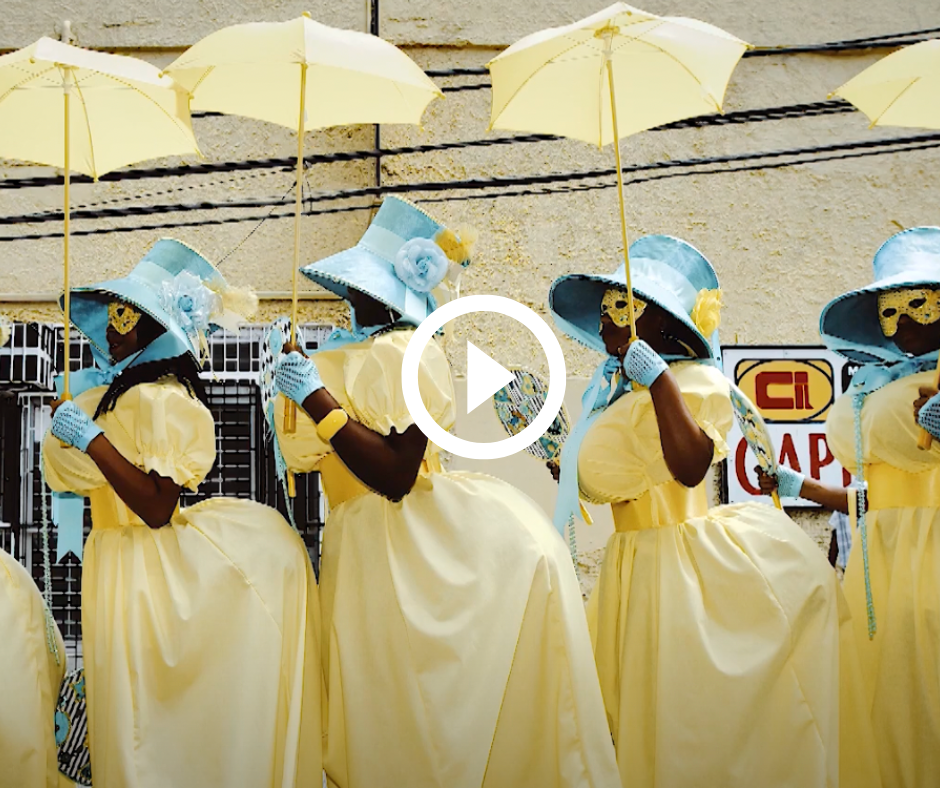
March 2025
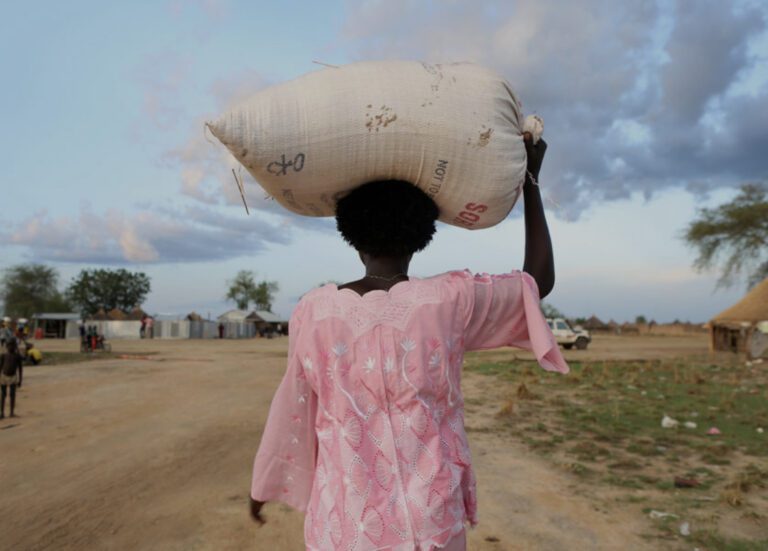
Mary Ngok, a farmer, carries grain in Jonglei, South Sudan, provided by USAID through a contract with Catholic Relief Services. Photograph: Catholic Relief Services.
In this issue, we examine the global crisis created by US president Donald Trump’s gutting of the world’s largest philanthropic donor, the U.S. Agency for International Development. We take a peek behind the curtain at its neocolonial role while highlighting the opportunity for Black solidarity economy organizers in the midst of this crisis to forge Pan African connections that build resilience and community self-determination.
Keep scrolling for the newest news and resources across the global Black solidarity economy, and the latest on what we’re up to at Collective Diaspora.
Like what you’re reading? Help us to keep producing it with a donation.
Maroon Dispatches
News from across the global Black solidarity economy
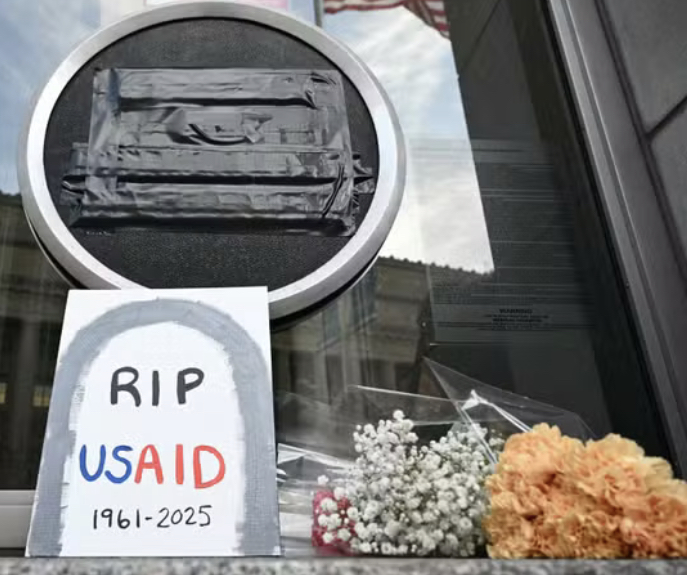
Tributes placed beneath the taped over seal of the US Agency for International Development in Washington, DC on Feb 7th. Photograph: Mandel Nagan/AFP
The Gutting of USAID: A Window for Decolonial Cooperative Development? (US)
Since returning to office on Jan 20, 2025, Donald Trump’s full frontal assault on racial and gender justice is revealing itself to be a cover for classic neoliberal economic shock therapy: dismantling government and its regulatory functions in order to facilitate a transfer of power and wealth to corporations. Government agencies from the Dept of Education to the Internal Revenue Service have undergone massive layoffs. His first target proved an effective test case for this approach, an agency few in the US even know of, the US Agency for International Development (USAID).
Since its creation in 1961, USAID has been tasked with providing humanitarian aid to people around the world. With its $40B budget it is the world’s largest donor, providing food aid and health services to tens of millions of people worldwide. Within weeks of Trump’s inauguration, the agency laid off nearly 10,000 employees, gutting global humanitarian efforts and ending long-standing programs - from health and education to food access - including cooperative development assistance. The agency was projected to be completely dissolved by September with only some of its basic humanitarian relief functions rolled into the US State Dept. Although a recent court injunction questioning the constitutionality of the shutdown is likely to delay those plans.
The abrupt rollback has left local grassroots initiatives around the world struggling to sustain themselves or shutting down entirely. It’s an effect mirrored in the US itself as the nonprofit organizations, contractors, and farmers that provide the technical assistance, grain, and other goods & services for USAID projects have been forced to stop work and have sued for back pay.
Yet, while the gutting of USAID has sent shockwaves through the international development sector, many of its defenders (including in the white-led cooperative sector) - in arguing that the agency makes the U.S. more “secure”, furthers “U.S. interests”, and supports US businesses, inadvertently acknowledge the criticisms of USAID across the Global South: that U.S. foreign aid has always been a means of control—one that simultaneously enriches US companies at the expense of local economies and positions the U.S. as an indispensable savior.
USAID: A Colonial Tool in Disguise
Since its founding during the Cold War, USAID has been a key instrument of U.S. “soft power”, using humanitarian aid as a means to secure global influence, allegiance to US foreign policy, and ensure that US corporations are able to extract a steady stream of raw materials. It has been criticized for funding opposition to leftist governments, collecting intelligence for the CIA, and undermining local economies by paying US companies to deliver aid services, such as in Haiti, where USAID inundated the country with imported free rice, leaving local rice growers unable to compete and decimating the sector. Today, Haiti imports nearly all of its rice and buys it from U.S. companies.
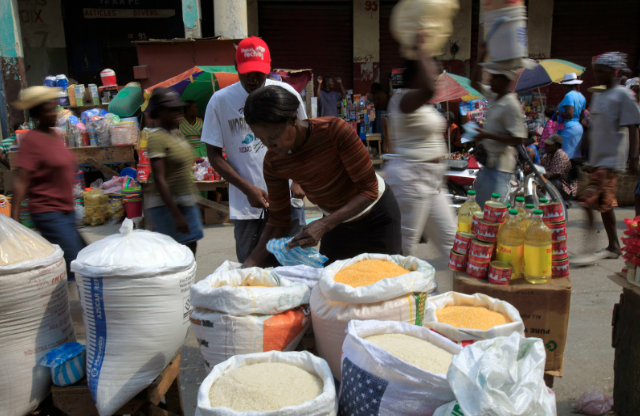
Maria Carmelle Jean, center, sells imported rice and dry goods at a downtown street market in Port-au-Prince, Haiti. Photograph: Jorge Saenz/Associated Press
Even cooperative development under USAID is tied to this dynamic, helping form farmer cooperatives throughout the Global South that supply US food manufacturers. The cooperatives enable local growers to earn slightly more for their crops but stop short of helping them develop their own processing capacity (because that’s where the greatest profit margins are made by US manufacturers). This is the very reason why our member, Chocolate Rebellion (the Cross Atlantic Chocolate Collective), a Black cooperative of cacao growers throughout Africa and the Americas, adopted their innovative model of teaching each other across borders how to make their own chocolate from the cacao beans they’d been harvesting for years, and sharing the processing equipment needed to do it.
Towards Decolonial Cooperation
The sudden evaporation of USAID’s funding has left a giant void that is expected to create immense pain and suffering for millions as food aid, medical supplies, and more dry up around the world. At the same time it has prompted alternative voices throughout the Global South to call for building local economies free from neocolonial strings.
While China is expected by many to step into the power vacuum left behind by the dismantling of USAID, it is unlikely to replace it. This leaves room for the expansion of decolonizing efforts such as Chocolate Rebellion’s translocal cooperative development and Burkina Faso’s manufacturing infrastructure campaign.
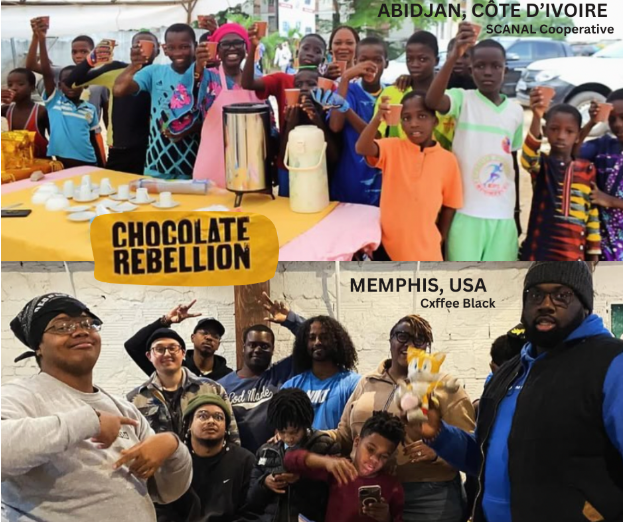
Chocolate Rebellion’s approach offers a powerful model of Global South-North solidarity, bridging Global South farmers and Global North food manufacturers within a single cooperative. By forming a “chocolatier hive” of Black chocolatiers in the U.S. to complete the final stages of chocolate production for U.S. markets while leaving early production stages for the farmers, their model creates jobs in Black communities across East Cleveland, Memphis, and Chicago while enabling Black cacao farmers in 12 Caribbean and African countries to retain more of the wealth they’ve long exported.
The push for decolonization’s shift in power relations extends of course into the allocation of capital that makes it possible. Alternative funding mechanisms, including grassroots investment networks and solidarity-based financial models, must take center stage in order to support transitions to new models.
For Black solidarity economy organizers, this moment calls for a radical reimagining of how cooperative economies are built and sustained—free from neocolonial purse strings and rooted in community self-determination, cross border collaboration, and diasporic solidarity.
Beat the Drum
Calls for Support
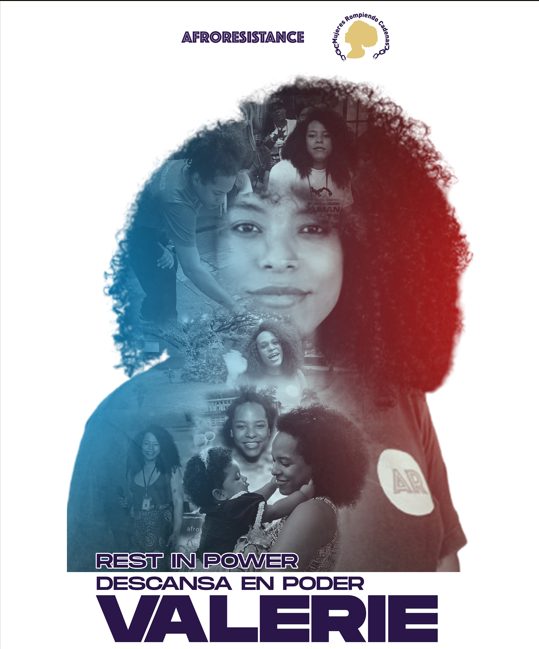
- Call for Donors: The Valerie Summers Black Trans Justice & Futures Fund - Valerie Summers was a force of resilience, love, and unyielding commitment to justice. As the Race and Gender Coordinator for our partners at AfroResistance, she dedicated her life to advocating for the rights, dignity, and safety of Black trans women. She was a loving mother, the first Black-trans woman in Colombia—and all of Latin America—to become a mother. Valerie’s tragic and untimely passing was a product of the violence and systemic neglect that Black trans women endure daily. In her honor AfroResistance has launched the Valerie Summers Black Trans Justice & Futures Fund, dedicated to providing direct support to Black trans women in crisis, ensuring that they have access to housing, legal aid, healthcare, and security, as well as supporting their leadership, education, and economic empowerment so they can not only survive but thrive.
Call for Subscribers: WTF?!?! Federal Funding Freeze listserv - A group for Farmers, Land Stewards, Community members & their Supporters who want to stay informed about the federal funding freeze and resources to address the resulting challenges. More info at Land & Liberation’s Federal Funding Resources page.
Collective Diaspora News:
The latest on our progress and upcoming activities.
We recently entered into a partnership with the UK-based Digital Commons Cooperative, the creator of the newly launched Cooperative World Map. The collaboration will allow Collective Diaspora to feed data on Black cooperatives into the world map while using the technology to create our own map specifically showcasing the global Black cooperative ecosystem. We’re looking for volunteers throughout the Americas and Africa to assist in a Black solidarity economy crowdsourcing campaign. If you’re eager and able to assist with either marketing or research, email omar@diaspora.coop.
Global Black Solidarity Economy in the News
News articles/essays/press covering any aspect of the Black solidarity economy
- Trinidadian Nonprofit Turns Cocoa Bean Farmers Into Chocolatiers (Trinidad)
- Black farmers among those left in limbo amid federal funding freeze (US)
- Social justice and Black cooperative history (US)
- Cooperation Jackson launches online series to ‘build ecosocialism from below’ (US)
- Philadelphia declares 2025 the Year of Cooperatives (US)
- FMAFS keen on revitalizing Cooperative sector for Economic Advancement (Nigeria)
- Community Wealth Building: Narrowing the Gap Between Governance and Government (US-Scotland)
- La otra cara del Caribe: mujeres afrodescendientes cacaocultoras y ciencia (Honduras)
- Colored Farmers’ National Alliance and Cooperative Union (1886-1891) (US)
- 2024 BLACK SOLIDARITY ECONOMY FUND GRANTEES (US)
- Ethiopia’s cooperatives, unions model for Africa: Regional Director for Int’l Cooperative Alliance (Ethiopia)
- Celebrating Collective Courage: 10 Years of Inspiring Cooperators Worldwide (US)
Resource Library: Podcasts & Videos
- Stacey Sutton Ph.D., and Assata Richards discuss the Components of Building a Solidarity Economy (Everything Co-op)
- Build and Fight Lecture Part 2: Mutual Aid & Economic Resistance (Hard Knock Radio)
- Jessica Gordon-Nembhard, Ph.D. & Ahzjah-Netjer Simons Launch Women’s History Month Series Moving Forward Together! Women Educating & Inspiring Generations (Everything Co-op)
- Breaking Down the Political Theater & Real Threats Behind Trump’s Speech (Kali Akuno, Medea Benjamin, Thandi Chimurenga (Hard Knock Radio)
- 2025 Black History Month Series “African Americans and Labor” Concludes with VOLTS (Village of Leaders Thriving in Solidarity) (Everything Co-op)
- Racial Equity: Restorative Justice in Black Community Development (NDCC)
- How the Open Road Fund is Building Black Wealth (Nexus Community Partners)
- Vernon Oakes discusses the 2025 Black History Month Theme “African Americans and Labor” (Everything Co-op)
- Julian Hill discusses the 2025 Black History Month Theme “African Americans and Labor (Everything Co-op)
- Trump’s Administrative Coup w/ David Cobb & Kali Akuno (Jacobin Radio)
- amaha sellassie discusses Gem City Market and the Cooperative Agenda of 2025 (Everything Co-op)
- Malik Kenyatta Yakini, Discusses Food Sovereignty, and the Detroit People’s Food Co-op (Everything Co-op)
- How Has Racism Held Back Economic Democracy? (Looks Like New)
Digging Deeper (websites, Books, Journal Articles, Reports, and More
- Employee Ownership For Black Workers: Closing The Racial Wealth Gap (report) - This study by the Morehouse College International Coparative Labor Studies program looks at the potential of employee ownership transitioning Black workers from employees to cooperative owners in their place of work as one possible route to asset building that has growing interest.
- Strategies to Advance Black Employee Ownership (report) - Project Equity’s publication, Strategies to Advance Black Employee Ownership Employee Ownership offers strategies and practical considerations to advance Black employee ownership as a complement to the Morehouse College paper, Employee Ownership for Black Workers: Closing the Racial Wealth Gap.
- Disaster Justice: A Guidebook for People of Color with Disabilities (report)
- 2025 Federal Funding Freeze Resources (web portal) - A container for relevant Executive Orders, Federal Funding Freeze information, relevant litigation & the on-going impacts on the communities we love and serve.
- Safeguarding Food Justice Organizations: Navigating Compliance and Mitigating Politically Motivated Risks (fact sheet) - Nonprofit organizations operate under a complex framework of federal and state laws. To govern and manage effectively, staff and board members must have a solid grasp of these requirements and the risks associated with non-compliance. The following outlines opportunities for organizations to identify and address vulnerabilities and a checklist to help mitigate risks from politically motivated attacks.
- Questions submitted for WTF?!? Federal Funding Office Hours & Crowd-sourced Answers (fact sheet/FAQ) - Community-sourced questions & answers on the on-going Federal funding freeze impact of the Executive Orders, OMB Memos, & ensuing litigation.
- Immigrant Support Resource Hub (web portal)
Funding
- 2025 J.M.K. Innovation Prize (US) The J.M.K. Innovation Prize is a $150,000 prize open to US-based nonprofit and mission-driven for-profit organizations with game-changing projects or ideas in heritage conservation, the environment, and social justice.
- Rhythmic Sabbatical Fellowship (US) A 6 month sabbatical for BIPOC movement leaders in Minnesota and geared toward those who cannot take a continuous block of time off. Applications accepted March 3-24
No Movement Without Art
Songs, Film, Murals, and Paintings
Upcoming Events
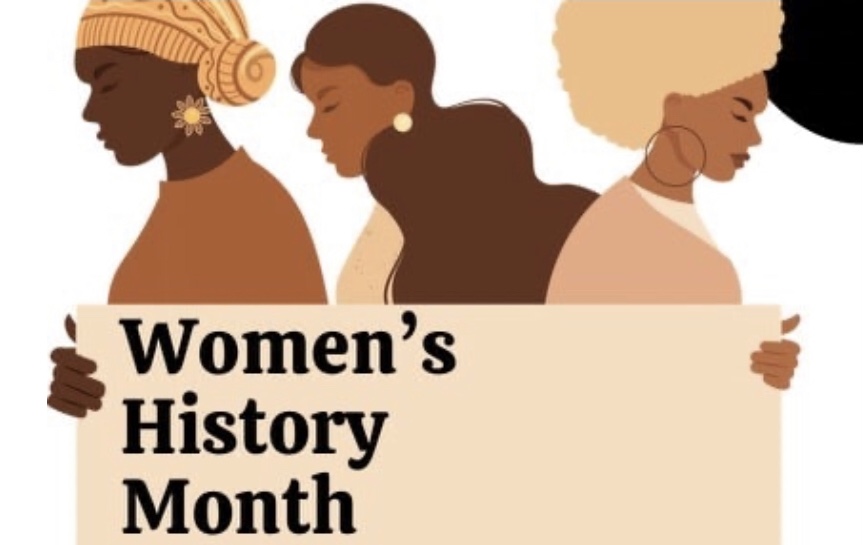
March (month long) - Women’s History Month (US)
- Mar 5 - May 21 - Black CoopNomics Academy (Baltimore, MD, US)
- This hybrid academy offers a unique opportunity to collaborate, learn, and share insights with like-minded practitioners and leaders who are passionate about fostering economic empowerment and social equity through cooperatives.
- Mar 6 - May 22 - Black CoopNomics Academy (Washington, DC, US)
- This hybrid academy offers a unique opportunity to collaborate, learn, and share insights with like-minded practitioners and leaders who are passionate about fostering economic empowerment and social equity through cooperatives.
- Mar 20 - What to Expect When You're Expecting Fascism (online)
- This 90-minute course takes participants on their own personal journey through the observation, definition, experience, and inevitable defeat of fascism. Participants will gain a clearer perspective on what is truly at stake for this nation’s democratic experiment and how we will win together.
- Mar 20 - The Road to #Baraza2025 (virtual)
- Part of the lead-up to the African social movements conference in April. This event spotlights emerging social movements across Africa to ignite bold conversations on innovative ways of organizing - new tools, new platforms and new voices that are breaking old limitations and pushing for transformative change.
- Mar 22 - Cooperative 2.0: Stories of Collective Power (online)
- Mar 23 - Resist & Build: Atlanta's Legacy of Struggle and Visions for a Just Future (virtual)
- A powerful conversation between renowned scholar Jessica Gordon Nembhard and frontline organizers in Atlanta as they explore the city’s rich history of resistance, collective building, and the ongoing fight for justice. This panel will delve into Atlanta’s pivotal role in shaping social movements and offer insights into the strategies and visions that guide the path toward liberation.
- Mar 27 - Building Power through Bold Leadership (virtual)
- Hear from guest speakers on the scope and impact of Nexus Community Partners' Boards & Commissions Leadership Institute, which has been helping community leaders build the skills and networks they need to create big policy change, from city-wide paid sick time to fighting housing discrimination.
- Apr 8 - Build & Fight Educational Series: Food Sovereignty and Land Decommodification (online)
- Apr 14-16 - African Social Movements Baraza 2025 (Accra, Ghana)
- Under the theme “The Power of Social Movements”, the African Social Movement Baraza will foster solidarity and collaboration, by providing a platform to develop common African positions on pressing global and regional issues, share emblematic organizing experiences, and amplify voices advocating for social justice and equality.
- Apr 23 - Tech Assessment Workshop for Your Co-op (virtual)
- Cooperation New Orleans & Mycelium Tech Co-op invite you to explore how technology can be used in a less extractive way to maximize the impact of your co-op, and advance the solidarity economy. In this virtual session you will identify solutions to address problems and opportunities, specific to your co-op.
- May 2-5, Resist & Build Summit (Atlanta, US)
- The Resist and Build process bridges the gap between resistance movements and initiatives to build a transformed system, recognizing that resistance without a clear vision risks mere reform, while building alternatives without roots in resistance risks exclusion and co-optation.
- May 13 - Build & Fight Educational Series: Worker Self-organization (online)
- May 19 - Thousand Currents Academy: Building Solidarity with Global Movements (Atlanta, US)
- Now in its 10th year, the Academy aims to promote culturally competent, human rights-focused, and social justice-based approaches to philanthropy and is for those in philanthropy who are either new to global funding or wish to deepen their practice.
- May 30 - Jun 1 - 2nd bi-annual National Black Radical Organizing Conference (Indianapolis, US)
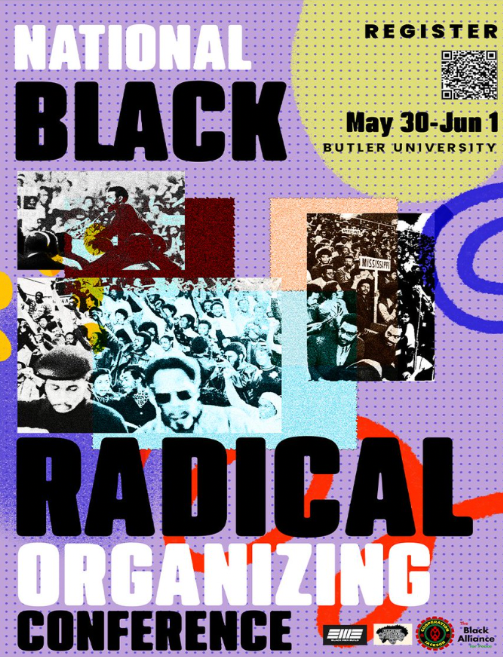
- Jun 3 - Learning from Feminist Cooperators in the Americas (London, UK)
- Jun 7 - Women's Multicultural Resource & Counceling Centre Annual Gala of Hope (Oshawa, Canada)
- Jun 10 - Build & Fight Educational Series: Community Production (online)
- Jun 13-15) - National Conference on Black Cooperative Agenda (Atlanta, US)
- Jul 8 - Build & Fight Educational Series: Social Digital Infrastructure (online)
- Jul 17-31 - 2025 Repaired Nations Black Solidarity Conference Tour (Jamaica)
Repaired Nations is offering transformative cultural exchange experiences providing opportunities to learn more about cooperatives, connect with global resources, engage in nation-building, and reconnect with sacred indigenous roots.
- Aug 12 - Build & Fight Educational Series: Self Defense (online)
- Sept 2 - Build & Fight Educational Series: Peoples Assemblies & Planning Councils (online)
- Oct 8 - NCBA Co-op Impact Conference (Washington, DC, US)
- Oct 14 - Build & Fight Educational Series: General Strike (online)
- Oct 25 - Nov 9 - 2025 Repaired Nations Black Solidarity Conference Tour (Ghana)
Repaired Nations is offering transformative cultural exchange experiences providing opportunities to learn more about cooperatives, connect with global resources, engage in nation-building, and reconnect with sacred indigenous roots.
- Oct 29-31, Global Social and Solidarity Economy Forum (Bordeaux, France)
- Nov 11 - Build & Fight Educational Series: Democratize The Economy (online)
- Late Nov - 2025 Repaired Nations Black Solidarity Conference Tour (Tanzania)
Repaired Nations is offering transformative cultural exchange experiences providing opportunities to learn more about cooperatives, connect with global resources, engage in nation-building, and reconnect with sacred indigenous roots.
- Dec 16 - Build & Fight Educational Series: Dual Power & Free The Land (online)
Thank you for reading this month’s Global Black Solidarity Economy Newsletter. Have a news tip? Email omar@diaspora.coop.

